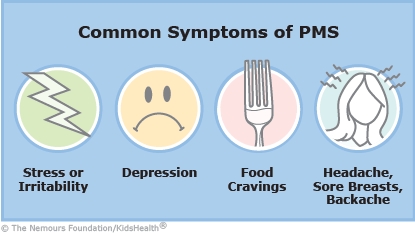Premenstrual syndrome (PMS) is when changes in someone's body and mood happen in the 5–10 days before or at the start of their period, then go away completely 2–3 days into the period. Common symptoms include feeling stressed, irritable, or sad; food cravings; headache; sore breasts; and backache.
Making changes in everyday activities such as being active, eating well, getting enough sleep, and managing stress can sometimes help with PMS symptoms. If needed, health care providers can prescribe medicine.



You:

You're worried that you will try to commit suicide (end your life), or you have a specific plan for suicide.
You also can call or text the National Suicide Prevention Lifeline at 988.

What causes PMS? In the days before someone's period starts, hormone changes in their body lead to chemical changes in the brain that can cause mood changes and physical changes.
What other problems can PMS cause? PMS can also cause a feeling of fullness (bloating) in the belly and breasts, acne, tiredness, diarrhea, constipation, anxiety, and trouble concentrating. Sometimes these symptoms can interfere with school, work, and/or relationships.